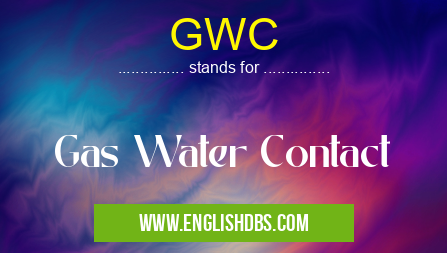What does GWC mean in CONTACT
GWC (Gas Water Contact) is a crucial concept in the oil and gas industry, denoting the boundary between the gas-filled and water-filled zones within a reservoir. Understanding GWC is essential for accurate reservoir characterization, resource estimation, and production planning.

GWC meaning in Contact in Contact
GWC mostly used in an acronym Contact in Category Contact that means Gas Water Contact
Shorthand: GWC,
Full Form: Gas Water Contact
For more information of "Gas Water Contact", see the section below.
GWC Meaning in CONTACT
The term "CONTACT" refers to the interface between two distinct fluids within a reservoir. In the context of GWC, it specifically indicates the boundary where gas and water come into contact.
GWC Full Form
The full form of GWC is Gas Water Contact. It represents the depth or elevation at which the gas and water phases meet within the reservoir.
What Does GWC Stand For?
- Gas
- Water
- Contact
Significance of GWC
- Reservoir Characterization: GWC helps define the geometry and volume of gas-bearing zones. This information is crucial for estimating gas reserves and planning production strategies.
- Production Optimization: GWC plays a role in optimizing production by identifying the most efficient locations for gas extraction and water disposal.
- Geologic Interpretation: GWC can provide insights into the depositional environment and fluid flow history of a reservoir. By analyzing the GWC, geologists can infer the distribution of fluids and the processes that have shaped the reservoir.
Essential Questions and Answers on Gas Water Contact in "CONTACT»CONTACT"
What is Gas Water Contact (GWC)?
Gas Water Contact (GWC) is the boundary between the gas-filled and water-filled zones within a hydrocarbon reservoir. It represents the depth at which the gas pressure equals the water pressure.
How is GWC determined?
GWC is determined through various methods, including well logs, seismic data, and pressure data. Well logs provide information on fluid properties and formation types, while seismic data reveals subsurface structures and fluid distributions. Pressure data from downhole measurements helps confirm the GWC depth.
Why is GWC important in reservoir management?
GWC is crucial for reservoir management as it:
- Defines the gas and water production zones.
- Aids in estimating gas and water reserves.
- Facilitates well placement and production optimization.
- Helps mitigate water encroachment and gas coning issues.
What factors influence GWC?
Factors affecting GWC include:
- Reservoir pressure and temperature.
- Fluid properties (density, viscosity).
- Capillary forces.
- Structural characteristics (faults, folds).
- Aquifer strength and connectivity.
How can GWC change over time?
GWC can change due to:
- Production activities (gas depletion, water injection).
- Natural aquifer recharge or depletion.
- Changes in reservoir temperature or pressure.
- Structural deformation or fault movement.
Final Words: GWC (Gas Water Contact) is a critical parameter in the oil and gas industry. It serves as the demarcation line between gas and water phases within a reservoir. Understanding GWC enables accurate reservoir characterization, reserve estimation, production planning, and geologic interpretation.
GWC also stands for: |
|
| All stands for GWC |
